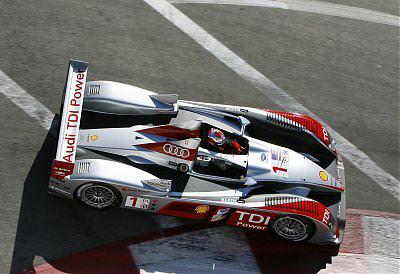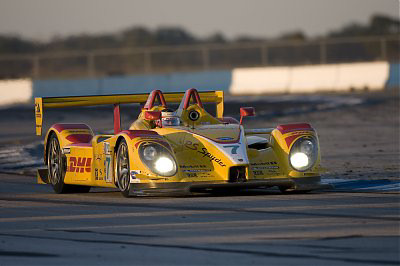The Way It Is/ Which sanctioning body has the courage and strength to write the correct formula for the future?
by Gordon Kirby As discussed in this space a few months ago, Audi's R10 turbo diesel has sparked a lot of interest in green fuel technology in racing. The Audi turbo diesel won the Le Mans 24 hours last year and the Sebring 12 hours the past two years, and also swept last year's ALMS championship. Audi has been racing inthe ALMS for seven years, originally with its traditional R8, and the German manufacturer was joined in the ALMS last year by Porsche and this year by Honda under its Acura brand, both competing in the LMP2 category.
As discussed in this space a few months ago, Audi's R10 turbo diesel has sparked a lot of interest in green fuel technology in racing. The Audi turbo diesel won the Le Mans 24 hours last year and the Sebring 12 hours the past two years, and also swept last year's ALMS championship. Audi has been racing inthe ALMS for seven years, originally with its traditional R8, and the German manufacturer was joined in the ALMS last year by Porsche and this year by Honda under its Acura brand, both competing in the LMP2 category.
Green fuels aside, all three of these manufacturers were attracted to the ALMS by the challenge of long-distance racing and because the series offers more room for technological development than the increasing majority of today's spec-car formulae. Honda/Acura racing boss Robert Clarke commented on his company's move into the ALMS.
"One of the key reasons we identified the ALMS series and why we want to be there," Clarke said, "is because at the moment it's the only series that's really embracing the idea of improved fuel technology in the way that it should be from a very broad base.
"The ALMS and the ACO for the 24 hours of Le Mans are the only sanctioning groups that really embrace what this is all about. Their regulations include gasoline, alcohol, diesel, even hybrid language in the rules, and they're talking about trying to make the rules even more broad to include hydrogen fuel, and such. Any fuel that you might bring, they'll figure-out a formula for it. I think what they're doing is very smart."
Porsche's RS Spyder LMPS car made its ALMS debut with Penske Racing last year, winning its class a few times, then winning outright this year at Long Beach and Houston. Porsche's Long Beach victory was Audi's first defeat in a year and a half and both Porsche and Acura hope to be invited by the Automobile Club de l'Ouest (ACO) to compete at Le Mans next year with their ALMS cars.

© LAT USA
"I think for sports car racing in particular, and racing in general, it's important to be relevant," Walliser said. "For me, sports car racing offers from history everything that is necessary for such a formula. We see sports car racing as the right place for us. We don't have to invent new rules or new ideas to attract us. Everything is there. For us, it's the perfect playing ground and proving ground.
"The current ACO rules allow different engines--V8s, V12s, V10s, turbos, normally-aspirated engines," Walliser continued. "They added different fuels, including diesel and gasoline. The ALMS series has already added a third fuel, an ethanol blend starting with E10 and perhaps in the future going to E55, or whatever. So in comparison to other racing series we have different concepts on the grid.
"Looking at the prototypes and at the CO2 reduction, which is what we're talking about effectively, this is engine efficiency. It's about supercharging, or not, different fuels, especially if we have a bioethanol or bio-based fuel content or a blended side that immediately reduces the CO2."
Honda's Clarke agrees with Walliser about the appeal of the ALMS's very open engine rules. "In the ALMS, you can pick your engine formula whether it's normally-aspirated, or turbocharged, or supercharged, or whether it's an in-line four or V-6, or V-10 or V-12," Clarke said. "To be also able to pick your fuel just adds to that appeal."
Porsche's engineers also like the ACO/ALMS air restrictor rules. "I think the engine rules in the ALMS with the restrictors always give you a clear indication of the amount of air you have in the engine," Walliser said. "With the amount of air known, it's clear what fuel you can burn and the output is defined. A restrictor drives the engineers to improve the efficiency."
Added Laudenbach: "It's about the amount of oxygen it takes. That's what you have to live with. It sounds easy, but it's difficult for the engineers. I think it's a very difficult approach."
Porsche's primary dispute with the ALMS regulations is the amount of power a turbo diesel LMP1 car is allowed to produce. "The only thing from our point of view that is not in balance at the moment is the maximum amount of power that is allowed by a diesel engine and a gasoline engine in LMP1," Walliser said. "There is a big difference. We guess it's approximately one hundred horsepower. We see no reason why one particular solution should be given such a big advantage. We see it in the race in traffic on fast tracks. The (Audi) cars have so much power that they just go off on their own."

© LAT USA
"I think the tires at fourteen and sixteen inches are quite nice because it compensates the different weights of the cars with the lateral acceleration. If that is balanced we have the perfect formula that shows the fans and the consumer something about weight, engine efficiency and the engineering knowledge of the engineers of the company behind it. For me, that is the energy efficient motorsports formula. We are that close."
Added Laudenbach: "I agree with Frank that we are not really far away from a series that we can say is green racing."
Laudenbach said it's imperative for racing and the manufacturers to move to alternate fuels. "It should be relevant fuels--biofuels, something relevant," Laudenbach commented. "An E10 blend is going in the right direction. E10 is a fuel that is available on the market but like the diesel it's nothing extraordinary. It's a clean diesel. We've checked all the values. We made our own analysis on diesel fuel to know where we are, and it's relevant. That's where we're headed.
"There are different ways," Laudenbach added. "The IRL is using ethanol a hundred percent this year and because they're all the same cars I think that fits well into that series. It's a spec series and that's a great way to go for them.
"But the ALMS has different cars and different concepts. Therefore, I think having different relevant fuels fits well into sports car racing. I think the ALMS may be the most important series to support the drive to new fuel types because you have all the different concepts."
Walliser pointed out that even Formula One is heading in an increasingly defined, spec-car direction. "In Formula One they're talking about bringing everything to a standard," Walliser commented. "They're talking about standard ECUs, standard engines, standard brakes, standard gearboxes, wings, aero and tires. Everything is, or will be, to a spec. Today, all other racing series are spec series and there are no possibilities for the engineers.
"In all these other series we are talking about racing strategy and drivers. That's it. That's the situation in Formula One at the moment. If you spend enough money, you will win. It's not driven by technology. But sports car racing is driven by technology, especially the prototypes."
Walliser believes the ACO's controversial fueltank equivalency formula is a good way to go and a road map to future rules equating different energy sources. "I think the ACO made a really good step when they introduced the energy balance to the fuel cells," Walliser said. "They started to think about the volume of fuel and dictating an amount of energy that can be refilled to the car.
"At the moment we have the situation where a diesel gets 81 liters and a gasoline engine gets 90 liters, but they have the same energy. There is a restrictor in the refuelling rig so the refuelling time is the same even though the diesel is less fuel by volume. That is a very good idea with good thinking behind it. For the fans, they don't have to consider different volumes. It's easy. The car that refuels earlier needs more energy, so the car that is on the track longer is more efficient."
Honda's Clarke has no doubt that racing must adopt green fuel technology if the sport is to continue to thrive. "I think it's quite clear that if motorsports is going to continue in the future it has to become real and relevant and contemporary in the use of green fuels," Clarke remarked. "At the Detroit Auto Show this year every manufacturer was talking about what they're doing in this area. They all have their favorite fuels and none of them have a single direction. They all have their pros and cons.
"Every manufacturer has put a stake in the ground about what they believe is the right direction and they're all different. So if you want mass participation and competition, you're going to have to embrace multiple fuels."
Of course, the biggest obstacle to delivering alternate fuels to the marketplace is a lack of service stations and systems to dispense the fuel. "The fact is that the infrastructure for any of those does not exist at a level than can support mass supply," Clarke said. "That's the fundamental problem. Some of them, like fuel cell technology, is not developed to the level that it can support mass production. But still, for all of them, the infrastructure is a major issue."
Ethanol is the most available and deliverable alternate fuel and Honda has embraced the IRL's move to ethanol, building a new, 3.5-liter ethanol-spec engine for this year. "I think the IRL has made a good move," Clarke commented. "At least they're doing something, but it is limited in scope. As I say, we view ethanol as one of the transitional fuels. Ultimately, we're going to have to move to something else beyond ethanol."
Clarke and Honda believe hydrogen fuel cell technology is the way to go for the longterm. On Thursday, in part two of this week's 'The Way It Is', we'll continue this discussion about what the right formula for the future might be.
Auto Racing ~ Gordon Kirby
Copyright 2007 ~ All Rights Reserved
Copyright 2007 ~ All Rights Reserved
Top of Page